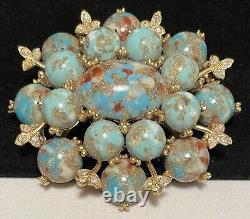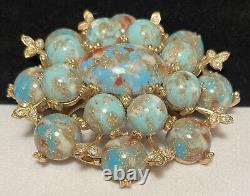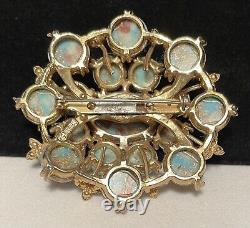HAR Brooch Rare Vintage 2-3/4 Gilt Blue Dinosaur Egg Rhinestone Pin Signed A41




HAR Brooch Rare Vintage 2-3/4 Gilt Blue Dinosaur Egg Rhinestone Pin Signed A41. Excellent condition - 1950's High End Designer Signed Collectible Piece. This amount will be added to your invoice. All the jewelry listed in my store is authentic vintage. Here is some information on the history of HAR Jewelry that I copied from the internet. HAR is known for excellent enameling and fantastic figural jewelry, including beautifully detailed Oriental figures with imitation ivory faces, exotic genies, cobras, dragons, and blackamoors.
Enameled fruits, small whimsical animals, and more traditional jewelry designs with imitation pearls, rhinestones, faux turquoise and coral were also made by HAR. Some of the designs include large misshapen stones with an iridescent glow for which HAR is known.
Selected pieces of HAR jewelry were featured in the famous 1990's "Jewels of Fantasy" exhibit propelling this jewelry to international fame. For years, jewelry sleuths have searched for clues about who made HAR's highly desirable designs. Were they made here or in England perhaps?
Could it be that HAR was an offshoot of another company such as Selini, Selro, or ART, companies also known for their exotic designs? To the delight of collectors everywhere, the mystery was solved recently when Roberto Brunialti, jewelry historian extraordinaire, and Susan Klein, author of several articles and a book on mid-century costume jewelry, discovered that the HAR mark was owned by Hargo Creations in New York City. Joseph Heibronner and Edith Levitt founded the company in 1955, just 3 years after they married.What's more, some of the most sought after designs, including the dragon and genie pieces, can be dated to April, 1959 based on U. In the 1960 Jewelers' Buyers Guide, the Hargo company was listed with an address of 82 Canal Street. Unfortunately, the company was somewhat short-lived. Heibronner died in August of 1968, which is probably why no records on HAR were found after 1967. Many companies have tried to imitate HAR figural jewelry but none have been able to quite capture the beauty that makes this jewelry so collectible.
In the case of HAR, one picture is worth a thousand words. Since the company was only is business for about 12 years, HAR jewelry (especially the figural pieces) is quite rare. You may not get another chance.
This information was written b y Jacqueline Rehmann.

